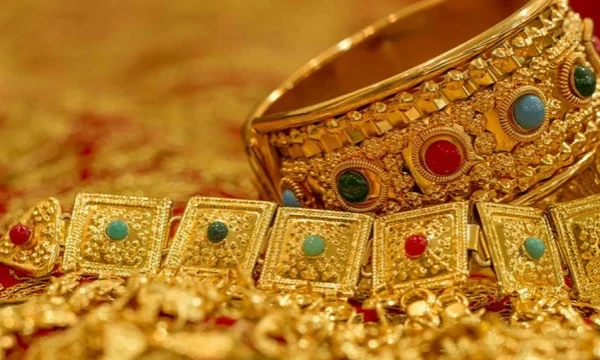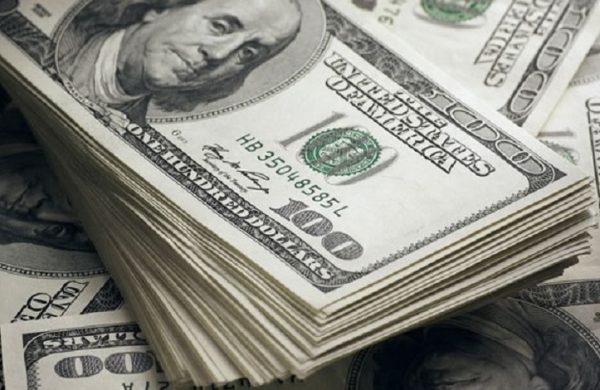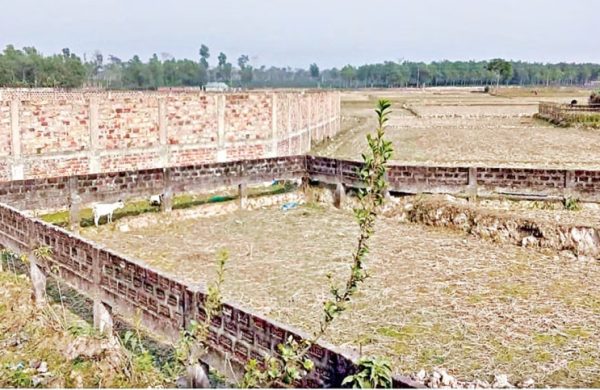Gold is comparatively costlier in Bangladesh
- Update Time : Monday, May 5, 2025

Staff Correspondent:
The price of gold had increased by Tk 39,600 per bhori in the past four months. The price has decreased slightly in the past few days, but still high at Tk 169,000 per bhori (22 carats).
The people in Bangladesh are obliged to buy gold jewelry due to various socio-economic reasons. Continuous rise of the price has left the middle and lower income buyers in trouble. On the other hand, gold traders say that the sale of gold jewelry has decreased.
The Bangladesh Jewelers Association (BAJUS) determines the price of gold in the country. The leaders of the organisation have said at various times that they fix the price in the country in line with the fluctuations in the price in the world market. The new price is announced every few days.
Analysis shows that the price in the country’s market is much higher than in the world market. For example, according to the information provided on the website of the Jewelers Association called Dubai Jewelry Group, a 22-carat gold bhori in Dubai, United Arab Emirates, was 4,217 dirhams yesterday, Sunday, which is Tk 139,500 in Bangladeshi currency. The price given on the website of the Bullion and Jewelers Association of India says that the price of gold jewelry shops in the country yesterday was Rs 106,959 per bhari. That is, Tk 153,658.
It is seen that the price of gold in Bangladesh is about Tk 29,500 per bhari higher than in Dubai and about Tk 15,000 higher than in India. It is to be noted that the wages for making jewelry and value added tax (VAT) are added to the price of gold fixed in shops in Dubai and India. VAT and wages are also added in Bangladesh.
Gold is rarely exported commercially in Bangladesh. Gold comes mainly through luggage by the passengers returning from abroad. According to the Passenger (non-tourists) Baggage (Import) Rules, 2016, a passenger can bring 10 bhori (117 grams) of gold while coming from abroad by paying a duty of Tk 4,000 per bhori. Price of gold in Bangladesh remains higher in Bangladesh even after adding the duty of Tk 4,000 per bhori. It is suspected that most of the gold comes into the country illegally. A large part of the demand is met with old gold.
Asked, BAJUS Vice President Masudur Rahman told journalist “The price of gold for jewelry is determined by adding a small profit to the price of pure gold. We have been determining the price of gold in the same way for a long time. The government and many businessmen are involved in this process.”
He said that if a ‘commodity exchange’ method is introduced in the sale of gold, the price difference with other countries will decrease.
Commodity exchange is such a method where commodities are sold just like the share market. The commodity is not sold directly, but through papers or electronic systems while the main commodity remains in the market or warehouse.
PRICE HAS INCREASED 993 TIMES
During the country’s Liberation War, the price of per bhori gold was Tk 170. In the next five decades, the price of gold has increased 993 times. Now the price of one bhori of gold is Tk 168,976. However, for a few hours on 23 April, the price was Tk 178,000, the highest price in the country’s history.
The price has increased significantly in the past two and a half decades.
According to the Jewelers’ Association, in 2000, per bhori 22-carat gold would cost Tk 6,900. It doubled in the next five years. In 2010, the price of gold tripled to Tk 42,165. Although the price did not increase much until 2015, it increased by Tk 26,852 per bhori in the next five years.
When asked where the price of gold could go, former General Secretary of the Jewelers’ Association, Dewan Aminul Islam, told journalist that many institutions are predicting a decrease in price from the first week of May unless the situation deteriorates again.
WHY DO PRICES INCREASE?
The price of gold is related to the global economy. Uncertainty in the economy means an increase in the price of gold in the gold market as many countries invest in gold in times of economic instability. It has been historically seen that the price of gold increases the most during times of high inflation. During the second wave of Covid, in the first week of August 2020, the price of gold per ounce (31.1034768 grams) in the global market exceeded $2,070. That was the highest price in history at that time.
Uncertainty gripped the global economy as the US President Donald Trump imposed retaliatory tariffs on various countries at the beginning of last month. The price of gold then started increasing sharply. The new price rose to $3,500 per ounce. At that time, the US multinational investment bank JP Morgan predicted that the price of gold per ounce may exceed $4,000 in the second quarter of next year (April-June).
However, the US trade war with China has eased somewhat and the price of gold started to fall.
The price of gold is also related to supply and demand. According to the International Gold Council, the global demand for gold was 4,974 metric tons last year.
The Bangladesh market is very small and there are no specific statistics of demand and supply here. However, it is believed that the country has a demand of 20 to 40 tons of gold annually. Only 10 per cent of this demand is met by old jewelry. The rest comes from abroad under the baggage rules and illegally. Gold is also smuggled from Bangladesh to India.
According to the Bangladesh Border Guard (BGB) and the Customs Intelligence and Investigation Department, the two government bodies recovered 143 kg of illegal gold in the seven months from August to February, whose current market value is more than Tk 1.96 billion.
GOLD IMPORT ALMOST STOPPED
The Ministry of Commerce has issued a gold policy in 2018 to bring transparency in the gold business in the country. Then, in November 2019, Bnagladesdh Bank issued licenses to 18 institutions including a bank, to import gold commercially. Later, another institution obtained a license. Multiple institutions imported gold initially in a few consignments. Later, there was a downturn.
It is known that traders have lost interest in importing gold due to the foreign exchange crisis, delay in obtaining permits and VAT. On the other hand, under the baggage rule for the 2023-24 fiscal years, the opportunity to bring gold was reduced by half (from 234 grams to 117 grams). In addition, the duty per bhori was increased from Tk 2,000 to Tk 4,000.
Ripon ul Islam, the owner of a jewelry house among the companies licensed to import gold, told journalist on 27 April that a bhori of pure gold costs Tk 160,000 taka in the wholesale market at the Tanti Bazaar in Old Dhaka. If imported commercially, it will cost Tk 167,000. Commercial imports are not done legally for that reason.
PRICE OUT OF REACH, SALES DECREASE
There is a tradition of gifting gold jewelry in Bangladesh which forces lower and middle income families to buy gold. Many people simply buy gold jewelry out of fancy. However, now gold jewelry is out of reach of the lower and middle class. Sellers say that ordinary buyers have reduced purchase of gold jewelry.
The reduction of people’s interest in buying gold is evident in Baitul Mukarram Mosque Market where 115 jewelry shops are housed. Jatan Ghosh, a salesperson at Rupsagar Jewelers there, told journalist that due to the high price of gold the sales have decreased.
Jewelry traders said that many people are selling gold jewelry instead of buying. They say that jewelry purchased earlier is now being sold at a higher price.
Suppose, a bhori of a 22-carat gold bought at Tk 69,867 five years ago now sells at Tk 140,000. That means Tk 70,000 profit per bhori. It is worth noting that when selling jewelry, the price is determined by deducting 17 per cent from the current weight.
Bangladesh is losing revenue from the gold market due to illegal trade. There are allegations that gold is used in smuggling and drug trafficking transactions.
Khandaker Golam Moazzem, Research Director of the private research organiSation Center for Policy Dialogue (CPD), told journalist that the biggest problem in the gold market in Bangladesh is the informal supply system of this precious metal.
He said the fluctuation of gold prices in the domestic market is not consistent with the global market. There is a lack of transparency in the process of determining the gold price. He said that in the current context, the government must monitor the gold market to restore good governance in the sector. Everything necessary needs to be done to formalise the business.


















